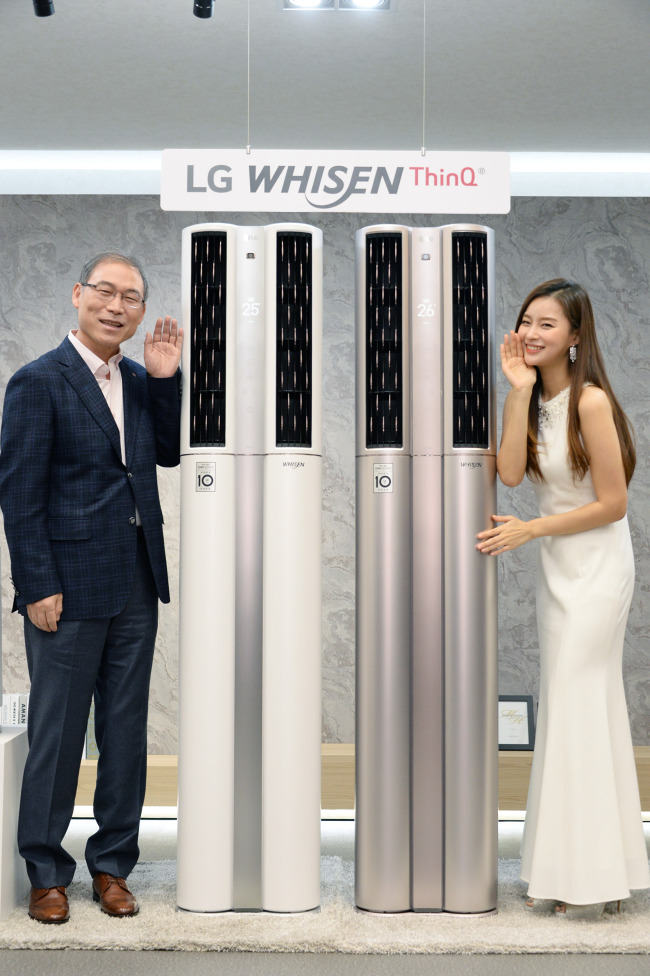LG Electronics kicked off this year’s battle in the market for premium air conditioners equipped with artificial intelligence by introducing its 2018 LG Whisen ThinQ air conditioner at a media event Thursday.
“The Whisen ThinQ air conditioner has evolved to an air conditioner that can see, hear, think and speak,” said Song Dae-hyun, president of home appliance and air solutions at LG.
“The Whisen ThinQ air conditioner has evolved to an air conditioner that can see, hear, think and speak,” said Song Dae-hyun, president of home appliance and air solutions at LG.

Song said that LG’s goal was to increase the proportion of AI-equipped air conditioners to 20 percent of air conditioner sales. Last year, that proportion remained below 10 percent -- a number that LG hopes to boost with its AI upgrades.
The latest air conditioner from the home appliances giant is an upgraded version of last year’s model, which touted the ability to learn about the space in which it is placed through sensors and provide optimal temperature control.
The 2018 version, the first model to bear LG’s ThinQ artificial intelligence brand, ups the ante with the ability to not only learn about the room, but analyze real time changes in inside and outside temperatures as well as patterns of user behavior, the company said. By learning about users’ setting patterns, the air conditioner will eventually be able to automatically adjust settings without having to receive inputs from users, it said.
According to Ryu Hye-jung, who heads the smart solution business division of LG’s home appliance and air solutions segment, the air conditioner takes about two days to sense its surroundings, and about four days of use to accumulate enough data to run the automatic Smart Care function.
The air conditioner can be linked to AI speakers and assistants beyond LG’s ThinQ Hub including Naver’s Clova, SK Telecom’s Nugu, KT’s Genie as well as Google Assistant and Amazon’s Alexa.
Technically, it will be possible to connect the air conditioner to rival Samsung’s Bixby AI. Both Samsung and LG are members of the Open Connectivity Foundation, which sets Internet of Things certifications that will allow IoT products from different companies to be interoperable. The OCF includes big names in the AI world including Intel, Microsoft and Qualcomm.
For now, according to an official with LG, the main target of the floor-standing air conditioner is domestic consumers, because of the low demand for floor-standing air conditioners.
This year, the household air conditioner market is expected to reach around 2.5 million units, slightly down from 2.8 million units last year, which saw extended high temperatures and a large number of families moving into new apartments.
With the new Whisen ThinQ, LG has made the first move in trying to lure customers in the premium air conditioner market, with Samsung poised to release its own premium model this month.
Samsung’s new Wind-Free model is also expected to include higher connectivity with surrounding devices using Bixby 2.0. According to reports, it will be an upgraded version of the first Wind-Free air conditioners released in 2016, which cool air without producing cold airflow.
By Won Ho-jung (hjwon@heraldcorp.com)







![[Graphic News] More Koreans say they plan long-distance trips this year](http://res.heraldm.com/phpwas/restmb_idxmake.php?idx=644&simg=/content/image/2024/04/17/20240417050828_0.gif&u=)
![[KH Explains] Hyundai's full hybrid edge to pay off amid slow transition to pure EVs](http://res.heraldm.com/phpwas/restmb_idxmake.php?idx=644&simg=/content/image/2024/04/18/20240418050645_0.jpg&u=20240419100350)





![[From the Scene] Monks, Buddhists hail return of remains of Buddhas](http://res.heraldm.com/phpwas/restmb_idxmake.php?idx=652&simg=/content/image/2024/04/19/20240419050617_0.jpg&u=20240419175937)

![[KH Explains] Hyundai's full hybrid edge to pay off amid slow transition to pure EVs](http://res.heraldm.com/phpwas/restmb_idxmake.php?idx=652&simg=/content/image/2024/04/18/20240418050645_0.jpg&u=20240419100350)

![[Today’s K-pop] Illit drops debut single remix](http://res.heraldm.com/phpwas/restmb_idxmake.php?idx=642&simg=/content/image/2024/04/19/20240419050612_0.jpg&u=)